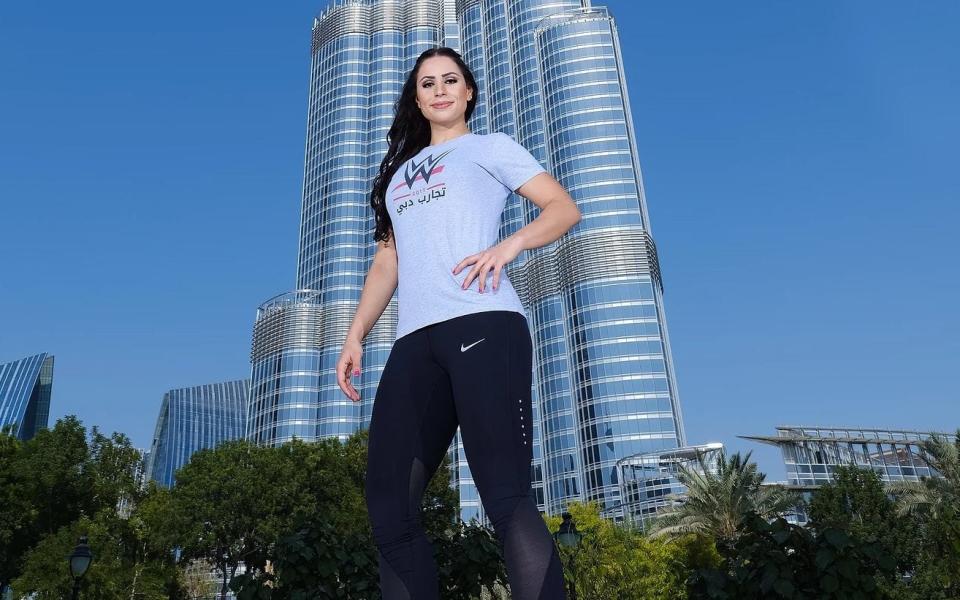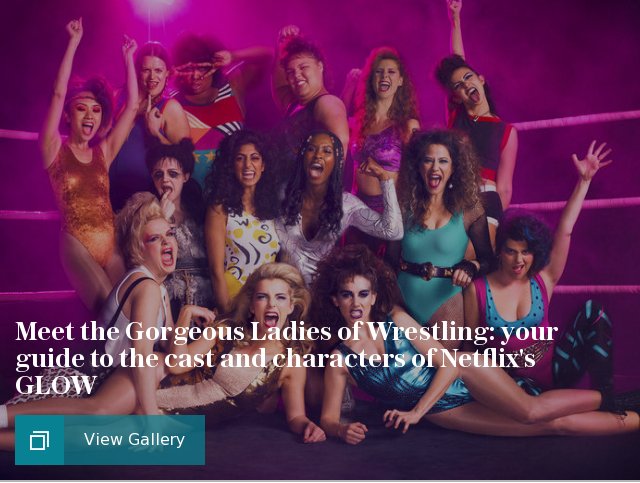'I feel a lot of pressure': Meet Shadia Bseiso, the first Middle Eastern woman to join the WWE

To the outsider, the pervading image of professional wrestling is one of pantomime masculinity; big sweaty, Adonis-like beefcakes and giant-bellied Northerners in ill-fitting spandex.
Shadia Bseiso, however, does not fit that mould. The presenter-turned-wrestler has just made history after becoming the first Arab woman from the Middle East to join the WWE, the world’s biggest wrestling promotion.
“It’s a privilege,” the 31-year-old says, “but it’s also a responsibility… so I feel a lot of pressure, but in a good way. When I step into a WWE ring I feel like I will be representing the Middle East, not just women from the Middle East.”
When she steps into the ring in the New Year Bseiso, who grew up in Jordan, was educated in Lebanon and is now based in Dubai, will continue the WWE’s run of female-led firsts: in October last year, it staged the first ever women’s “Hell in a Cell” cage match; then in June, the first ever women’s “Money in the Bank” ladder match, with women wrestlers scrambling up ladder to nab a championship match contract. In July, a first-of-its-kind all-female tournament, with 32 wrestlers from across the globe, took place.
Women’s wrestling is clearly having a moment, then - the WWE dubs it the ‘Women’s Evolution’ - and Bseiso is the logical next step. She may be a late starter to the grapple game, but the CrossFit devotee and three-stripe blue belt in Brazilian jiu-jitsu’s impressive win-loss record speaks for itself. She began training in jiu-jitsu aged 27, and was competing in tournaments after just three months. Now, she goes by the nickname “Armbar Girl”, after her favourite hold.
Crazy proud of @shadiabseiso for making history as the first ever Arab female WWE Superstar.As a fellow Middle Eastern, I'm rooting for you!
— Rufus M (@RufusMGS) October 19, 2017
“Over four years I did 16 competitions,” she says of her fighting history. “For 13 of them I was on the podium, for either gold, silver, or bronze.”
While studying Business Administration at the American University of Beirut in Lebanon, she began her first radio show at 18, and has gone on to become a household name in the Middle East, presenting TV shows including Dubai’s spin-off of The Voice, and hosting live sports and brand events for Nike and Pepsi.
WWE originally invited Bseiso to audition as presenter for its first Arabic language show WWE Wal3ooha back in January, but her passion for sports convinced WWE to invite her back for a four-day tryout at the Dubai Opera House – one of 34 athletes from 18 different countries.
When I step into a WWE ring I feel like I will be representing the Middle East, not just women from the Middle East
After impressing WWE trainers, Bseiso joins the WWE Performance Center in Orlando next January to begin her wrestling training – which involves how to properly execute wrestling holds, learning to “bump” (wrestling lingo for hitting the mat), and even the art of cutting a trash-talking promo. Also signed up to be a future “WWE Superstar” is Kavita Devi, the company’s first Indian woman wrestler.
It may seem a strange leap to go from TV presenting and Olympic competitions to the cartoon world of wrestling, but the appeal is that “I’ve always worked in entertainment,” Bseiso explains, “And I have a passion for sports. This opportunity will allow me to combine [both]. It’s unreal, this is the dream.”
And Bseiso’s signing feels like another milestone for female athletes in the Middle East, where women’s sport is growing - but still largely marginalised.

In 2016, Jordan hosted the under-17s women’s football world cup, the first tournament of its kind in the region. In Saudi Arabia, women have been banned from participating in national or state-organised sports, but last year created a women’s sports authority and will permit women to attend some sports stadiums from January 2018.
Bseiso credits the 2012 London Olympics with helping to boost the region’s female athlete contingent, when every participating country was required to send a female athlete – even Saudi Arabia, which sent two.
“It was the first time I got to see Arab women compete on TV at the highest level,” she says. “It was an incredible feeling. But at the same time I wondered, what if I’d seen this when I was growing up? Maybe I would have taken up sports earlier. I only started training four years ago. It’s a very late start.”
What do her parents think about her joining the bonkers world of pro wrestling? “My brother, my sisters, and I were brought up equal," she says. "My parents have supported me in whatever I’ve done. They’re excited, but WWE is very physical and you never know what’s going to happen in the ring. They’re worried about the risk of injury… but they also worry about risk of injury when I compete in jiu-jitsu.”
Bseiso isn’t the family’s only sporting success. Her sister Arifa is a former national boxing champion and was part of a controversial Nike advert featuring female Middle Eastern athletes.
If there’s been any backlash over Bseiso signing with WWE, she hasn’t felt it. “I always surround myself with a positive circle,” she says. “You need that.”
Undoubtedly, it’s on the big stage in WWE where women’s wrestling will have the biggest impact, but it’s not the only place it’s happening. Japan has a strong tradition; right here in the UK we have the ultra-feminist, punk rock promotion Pro-Wrestling: EVE; and even in Dubai’s local cene, there’s Joelle Hunter, a 5’4” hardcase who wrestles men and bills herself as the Arab world’s first female grappler.
Non-fans scoff at wrestling’s “sport” credentials, but this boom in women’s wrestling signifies the growing interest in women’s fighting.
Aside from the London Olympics, Ronda Rousey in the UFC, and the Women’s Evolution in WWE, Bseiso’s role as “the first Arab woman from the Middle East in WWE and Kavita Devi from India, this is the next chapter – [we are] globalising this Women’s Evolution.
“It’s the perfect time for women to make progress in sports and not have that ceiling any more. It’s been broken.”

